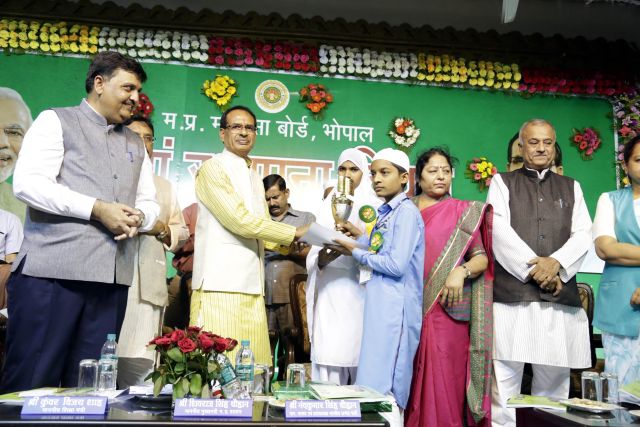
by admin | May 25, 2021 | News

Madhya Pradesh Chief Minister Shivraj Singh Chouhan felicitating Madrasa student on its Foundation Day in Bhopal.
By Pervez Bari,
Bhopal : Madhya Pradesh Chief Minister Shivraj Singh Chouhan has said that the amount given annually to each madrasa for infrastructure development will be hiked from Rs.25,000 to Rs.50,000. An auditorium would also be built for Madhya Pradesh Madrasa Board. Chouhan was addressing the 20th foundation day of Madhya Pradesh Madrasa Board and one-day Madrasa Shiksha Sammelan.
Chouhan said that modern education should also be imparted along with religious training in madrasas. Children need to be skilful as well in today’s modern times. While there is employment on the one hand, there is dearth of skilful hands. We have to check this situation. He said that children would have to be given modern education besides religious training to make them good human beings.
He said that the state government has not let any kind of discrimination in the education of children. There are schemes for everyone. A student is the best gift of God. Government is responsible to do its best for the students. He said that the aim of education is the transfer of knowledge, making students skilful and giving them good culture.
School Education Minister Kunwar Vijay Shah said that computer education is being given in madrasa classes since Class I. He said that the tricolour would be hoisted in madrasas also like in other schools of the state every day. He lauded the progress in imparting modern education in madrasa board. Madrasa Board Chairman Professor Sayyed Imadduddin informed that so far 2575 madrasas have been registered in which 2 lakh 88 thousand children are studying.
Meanwhile, Chief Minister Chouhan honoured best madrasas, best madrasa teachers and outstanding students on the occasion. He also released a souvenir containing the remarkable progress of Madrasa Board.
Women and Child Development Minister Mrs. Archana Chitnis, Minister of State for Minority Welfare Mrs. Lalita Yadav, MP Nand Kumar Singh Chouhan and Manohar Untwal, Chhattisgarh Madrasa Board Chairman Eijaz Baig, Mrs. Mehrunnisa from Rajasthan Madrasa Board, Central Hajj Committee member Mohammed Irfan, Tourism Development Corporation Tapan Bhowmik and Delhi’s Main Imam Omar Ahmed Iliyasi were present on the occasion.
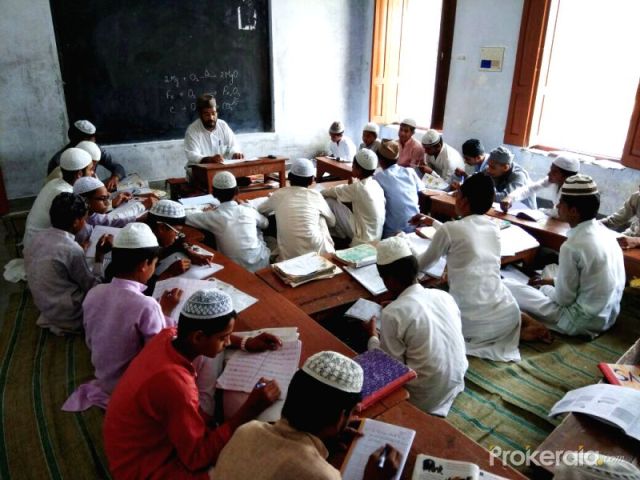
by admin | May 25, 2021 | News
 By Abu Zafar,
By Abu Zafar,
Azamgarh (Uttar Pradesh) : Abu Osama, an alumnus of Madrasatul Islah, one of the oldest Islamic seminaries in this region, believed that after graduating from a madrassa he would not be able to compete in the modern world. He soon realised he was wrong.
Osama, who works as assistant professor in the Department of Social Work at Maulana Azad National Urdu University in Hyderabad and who completed a masters degree from the Delhi School of Social Work, said: “I realised that there was so much I had learnt from the madrassa syllabi and curriculum besides Islamic values and ethics.”
Madrassas have been in the news for the wrong reasons, especially those located in Azamgarh, a district and city in eastern Uttar Pradesh that was once known for producing people of high intellect and for Hindu-Muslim brotherhood. However, in recent years it has, in media narratives, rather unfairly acquired the title of “terror nursery” because of its association with a succession of arrested Muslim extremists.
There are around 19,000 madrassas in Uttar Pradesh which have been in the cross-hairs of the Bharatiya Janata Party (BJP)-ruled state government which questioned their patriotism and sought video evidence of their mandatory singing of the national anthem.
But many of these madrassas, like those in Azamgarh, are challenging stereotypes to weave a positive counter-narrative. In seeking to keep pace with the times, a number of such madrassas have not only introduced modern, progressive syllabi but are also equipping their students with computers and other technological tools.
These madrassas impart knowledge in science, mathematics, economics, education, political science, English, Hindi and Persian languages and computer science, apart from Quran, theology and Arabic language. Some of them have also started polytechnics and mini Industrial Training Institutes (ITI).
A large number of alumni of these institutions are either involved in research in universities in India and aboard, or work in public and private sectors across India.
There are about 50 big madrassas in Azamgarh and neighbouring districts where approximately 50,000 students have been enrolled. These students come from various parts of Uttar Pradesh, Uttarakhand, Bihar, Jharkhand, West Bengal, Assam, Jammu and Kashmir, Haryana, Madhya Pradesh, Maharashtra and also from Nepal.
For the students, WhatsApp is a popular way of communication and most of them have Facebook accounts and email IDs.
When one enters Madrasatul Islah through its main gate, one finds the polytechnic building as the first academic building after the administrative block. Apart from courses related to various electronic branches, this polytechnic also offers mobile operating, computer and translation courses.
Islah, which was founded in 1908 and is one of the oldest Islamic seminaries in the region, has about 1,500 students.
About 50 km from Islah is another madrasa, Jamiatul Falah. Founded in 1962, it has 4,300 students of whom half are girls.
Maulana Mohammad Tahir Madni, Director of Jamiatul Falah, says that introducing modern subjects is necessary for Islamic madrassas.
“Jamiatual Falah was founded on the basis that we will incorporate both Islamic and modern education. We have been doing that since the foundation of the Jamia,” Madni told IANS.
“Through it, we aim to educate our children and enable them to represent Islam and community in a better and sophisticated manner,” Madni added.
Syed Mumtaz Alam graduated from Falah in 1994 and works as editor of the Delhi-based English news portal IndiaTomorrow.net.
“The syllabus of my madrassa was such that not even for a day did I think that I would have to earn my livelihood at a mosque or madrassa alone. No doubt, madrassas are commendably producing good human resources to run hundreds of thousands of mosques and madrassas in the country.
“But madrassas like my alma mater are nurturing young minds in a much broader manner; and, consequently, thousands of youth are also getting jobs in government departments, corporates and MNCs,” Alam said.
Alam, who headed the US-based community news portal TwoCircles.net for half a decade, said that the extracurricular activities of madrassas proved to be more helpful to his career.
“Besides the syllabus, it was the extra-curricular activities which shaped my career in journalism. Our common room or library had national dailies in English and Hindi besides Urdu and Arabic languages. We would bring out weekly wall magazines in different languages,” he explained.
According to the Sachar Committee report on the status of Muslims, only four percent of the students from the Muslim community enrol in madrassas.
While some conservatives in the community argue that this four per cent should specialise in Islamic teachings and have no need to learn modern subjects, Mohammad Asim, English teacher at Islah, believes that learning these modern subjects is helpful to understand and propagate Islam.
“Modern subjects are the need of the hour. Subjects like mathematics are necessary even to understand issues related to Islamic law of inheritance and business dealings, and science is helpful to deeply understand many verses of the Quran,” he noted.
Mohammad Saoud Azmi, a research scholar in JNU on madrassa syllabus, sees the introduction of modern subjects in the madrassa education system as a step in the right direction.
“It is a good sign that madrassas are equipping their students with modern knowledge but they have to improve their teaching style and have to add subjects like environmental science and modern economics,” he said.
(This story is part of a special series that showcases a diverse, progressive and inclusive India and has been made possible by a collaboration between IANS and the Frank Islam Foundation. Abu Zafar can be contacted atabuzafar@journalist.com)
—IANS
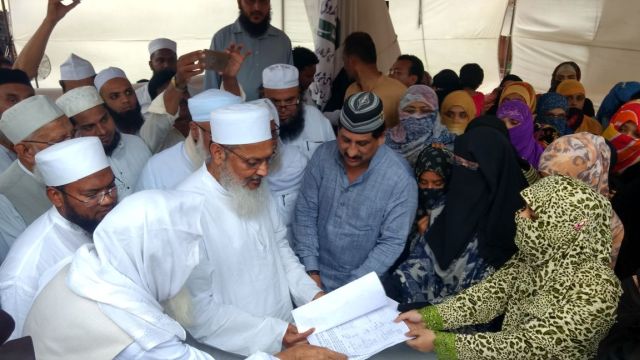
by admin | May 25, 2021 | News
 By Pervez Bari,
By Pervez Bari,
Bhopal, Sep 13 : Thousands of Muslim women in the jam-packed historic Iqbal Maidan in Bhopal on Monday raised their hands to express solidarity with the Islamic Shariah. They declared in unison that they are safe under the Islamic Shariah and would not tolerate any outside interference whatsoever.
This was the scene when Muslim women in several thousands came out of their home and made a beeline to attend the “Ijlaas-e-Aam Barai Khwateen” (Women convention) under the aegis of the All India Muslim Personal Law Board, (AIMPLB). It was first such convention of Muslim women after the Supreme Court judgement on Triple Talaq on August 22, 2017.
Iqbal Maidan was over-flowing with burqa-clad women who in rapt attention and in most disciplined manner listened to a host of speakers who emphasised the importance of Islamic Shariah and leading life as per its instructions in letter and spirit in all their day-to-day matters.
The speakers announced that they would seek the signatures of about three crore Muslim women on a memorandum against the Supreme Court judgment, which would then be sent to the Chief Justice of India. They termed Triple Talaq as a “right” that should not be taken away from them simply because some “uneducated women” had moved the apex court against it.
It may be mentioned here that the rally was held in the backdrop of the recent Supreme Court judgement which had annulled instant Triple Talaq known as Talaq-e-Biddat. This programme was organised after AIMPLB’s Executive Committee meeting was held here on Sunday. The Board has decided to hold such Islamic Shariah rallies to create awareness in Muslim men and women all over the country to shun Talaq-e-Biddat and other anomalies which have crept in.
A resolution was passed and signed by thousands of Muslim women present on the occasion. The resolution said: “We respect the Supreme Court judgement but would like to state that we believe in Islamic Shariat and instant Triple Talaq is part of it. Any restraint on this Triple Talaq will be infringement on our rights to practice Muslim personal law which the Constitution of India has given us. The signed resolutions were handed over to AIMPLB president Maulana Mohammad Rabey Hasani Nadwi and Secretary Maulana Mohammad Wali Rahmani. The duo will submit this resolution to the President, Prime Minister, Chief Justice of India, Union Law Minister ad Law Commission of India.
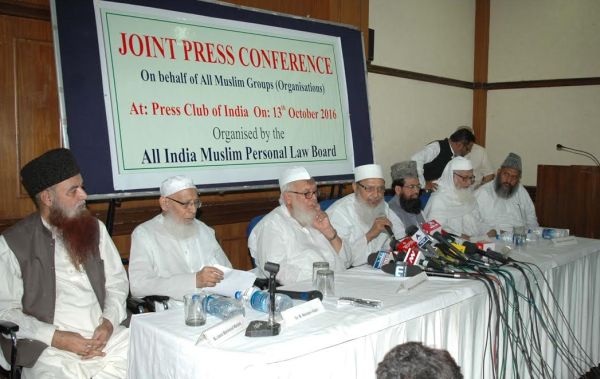
Islam empowered women 1400 yrs. ago
Dr. Asma Zehra, the convenor of AIMPLB’s Women Wing, who was the key speaker on the occasion, emphasised that Islam had empowered Muslim women 1400 years back. The issue of Triple Talaq is being used by the media to paint a picture as if the Muslim women are in deep distress and misery. But we all want to say that ‘Hum Pareshan Nahi Hain…’. We don’t want any changes in Shariat. If we have any social problems, we will solve them ourselves. We do not need the help of any government or courts”, she reiterated.
Attacking the NDA government at the Centre, AIMPLB executive committee member Asma Zehra wondered why the central government was trying to interfere only with the law governing Muslims when “women face atrocities and domestic violence in all religions”.
She said that the real empowerment is education. We can’t be empowered unless we are educated. But nowadays a new concept of empowerment is being peddled by the media. She appealed to Muslim women to follow Shariat in letter and spirit. “If we will live within the confines of Shariat, we will get success in life,” she exhorted.
Dr. Zehra said that these days Muslims are being targeted in media. Issues like marriage, divorce, polygamy, large number of children etc are highlighted in print and electronic media to defame Muslims. She claimed that 97 percent of the Muslim marriages are successful and Muslim women are secured and protected due to Muslim personal law.
Muslim women’s rights well protected under 1986 Act of Constitution
Dr. Zehra further maintained that Muslim women’s rights are well protected under 1986 Act of the Indian Constitution. There is also Section 1939 for marriage law. There is no need to make amendment in this law. Muslim women are secured through this act. Muslim women oppose amendment in Muslim Personal Law or enforcement of Uniform Civil Code as they are very much protected by Muslim Personal Law and there is no need for amendment, she added.
Later talking to media persons on the issue of Triple Talaq she revealed: “We run a toll free helpline for women in seven languages from 10 am to 5 pm. We get about 80 calls daily and up till now; we have received 40,000 calls from women complaining of disputes with husbands and in-laws. Our counsellors counsel them. We have passed a resolution at the executive committee of the Board saying that we will try to solve the problem of Triple Talaq cases and help women get their rights.”
Dr. Zehra also added, “The women wing of AIMPLB is also running a campaign to create awareness among Muslim women regarding their roles and responsibilities.”
Maulana Khalil-ur-Rahman Sajjad Nomani, a member of the Executive Committee of AIMPLB, addressing the assemblage on the occasion said that no one has the right and power to change the Shariat. “We respect the decision of the Supreme Court but we disagree with some parts of it. The court also says Triple Talaq is un-Islamic but not unconstitutional. In the coming days we will also demand a referendum to find out what Muslim women actually want? he asserted.
On the attitude of Central government on Triple Talaq, Maulana Nomani said: “It is the government of RSS. And they want to bring in Uniform Civil Code. They have even said that they will get the Muslim Personal Law Board disbanded”.
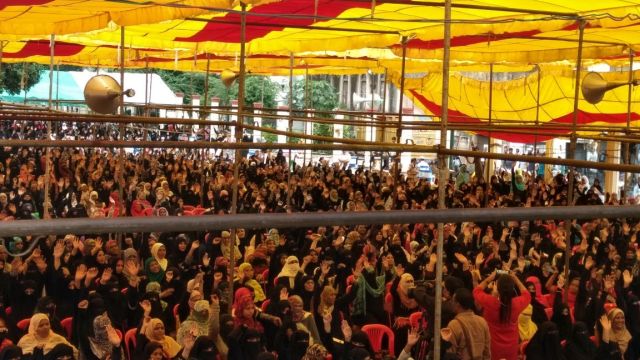
Dr. Soofiya Fatima Husaini, convenor of the AIMPLB’s Madhya Pradesh Unit Women Wing, who compeered the programme with aplomb while putting forth her views said: “We feel empowered due to Shariah and Triple Talaq is the best way to end relationship between husband and wife if they are at loggerheads continuously. “We can ourselves bring about any required change by educating people about Triple Talaq, but we will not allow anybody to change our law,” she affirmed.
Mamduha Majid ofDelhi said: “Not just women, men also need to be educated. Simply wearing a topi (skull cap) and having a beard does not make a person an expert in Islamic law. There are a lot of misconceptions and illiteracy that have impacted women’s rights. All this needs to be addressed and AIMPLB is working towards it.”
More than 5000 Muslim women, ranging from teenagers to the elderly, attended the convention. They included women from other parts of the state also. Many had skipped their classes to attend the meeting and others had chosen not to do their household chores. The venue was so crowded that some of the women had to sit on the floor and though the meet was scheduled to start at 11 am but women had started trickling in since 9. Two LED screens were installed for the benefit of those who could not find place inside.
Others who spoke on the occasion included Maulana Mohammad Rabey Hasani Nadwi, AIMPLB executive member Maulana Khalil-ur-Rahman Sajjad Nomani, Bhopal Shahar Qazi Maulana Syed Mushtaq Ali Nadwi, AIMPLB executive member Arif Masood, Ms Sabiha Sahiba etc.

by admin | May 25, 2021 | News

A view of the AIMPLB meeting in progress
By Pervez Bari,
Bhopal, Sep 12 : The All India Muslim Personal Law Board, (AIMPLB), has passed a resolution to constitute a committee to examine the Supreme Court judgement on instant Triple Talaq to see the inconsistencies, if any, with the Islamic Shariat. The Committee shall also advise the method and process for undertaking large scale community reform programme within the Islamic Sharia (Islah-e-Mashrah).
The above decision was taken by the AIMPLB in its Executive Committee’s marathon meeting here on Sunday. The Board again accused the government of attempting an attack on Muslim personal laws, and welcomed the court order for not going in that direction. The meeting did not discuss filing a review petition against the Supreme Court order holding instant triple talaq (Talaq-e-Biddat) illegal.
It may be recalled here that on August 22, a five-judge Bench of the Supreme Court, by a 3-2 majority verdict, had held the practice of instant triple talaq illegal. Several Muslim organisations, including the Jamiat Ulama-i-Hind, among the oldest in the country, had objected to this, saying that instant triple talaq should continue and be recognised as a legitimate divorce among Muslims even if that meant courting punishment as per the law of the land.
Addressing a joint Press Conference Executive Committee Members said the AIMPLB has further resolved to initiate different programmes at different levels to educate Muslim women and men on Shariah and in this process it shall take assistance from different organisations. The Board also resolved to take appropriate steps to ensure help to divorced ladies. It shall urge upon the government to grant financial assistance to Waqf Boards for this purpose.
Kamal Farooqui, member of the Executive Committee, on behalf of the Board made a categorical statement that the Muslim Community cannot and shall not tolerate such attack on personal law of the community. He said in the light of the Government India had laid bare its intention in the form of Attorney General’s submission in the Supreme Court that all forms of dissolution of marriage without intervention of the court should be declared as unconstitutional.
“We record our displeasure and consider it as attack on personal law of Muslims. This stand of the present government is contrary to the protection guaranteed by the Constitution of India”, Farooqui emphasised.

Dr. Asma Zehra, the convenor of AIMPLB’s Women Wing, addressing Press Conference at Bhopal
Replying to a question Dr. Asma Zehra, the convenor of AIMPLB’s Women Wing, Board’s position, as per Shariah applicable the four Sunni School of thought has been that the Talaq-e-Biddat is sinful but valid. Prior to the judgement the Board had already submitted to the Supreme Court that the AIMPLB had passed a resolution on 16-04-2017 stating that those who indulge in Talaq-e-Biddat should be socially boycotted.
Dr. Zehra pointed out Sunday’s resolution said Islamic/Sharia law is based upon Quran, Hadith, Ijma and Qiyas and that the sanctity of belief and practices in personal/matrimonial relationship in Islamic laws cannot be treated differently from the belief and practices in personal/matrimonial relationship by other citizens who follow own customs and practices.
She claimed 99 per cent of Muslim women are in favour of Muslim personal law. “In the name of showing sympathy with Muslim women, a door is being opened to interfere in our religion.” She added that there would be a lot of difficulties in implementing the SC order on triple talaq.
Babri Masjid case
Meanwhile, the AIMPLB executive committee also expressed its surprise over the Supreme Court’s decision to begin hearing the Babri Masjid case on a daily day-to-day basis. Noting that the court had previously found it impossible to speed up the hearing because it had to go through a lot of documents, the board said it would abide by whatever the court decides. However, the process has to be judicial without bringing politics into it. It’s related to property, it’s a title suit.
Adv. Zafaryab Jeelani, member of the Executive Committee, said the court had now given very little time to the two parties, and that there was not enough time to translate all the documents. Saying “we would do our best”, the board said, “We feel this may be used as a plank by a certain political party. We want the might and respect of the court should not be compromised. Court is our last resort.” “Justice hurried is Justice buried”, he quipped.
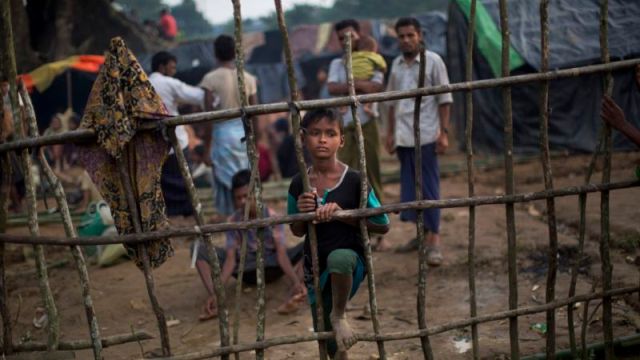
by admin | May 25, 2021 | Opinions
 By Amulya Ganguli,
By Amulya Ganguli,
The Union Minister of State for Home, Kiren Rijiju, is looking for a round of applause for not driving the Rohingya refugees in India into the sea or shooting them; all that he wants is their deportation.
It is, however, doubtful whether the process of exiling them will be uncomplicated since it is bound to raise humanitarian concerns in India and elsewhere.
It is not easy to harshly deny shelter to a group which has had to leave their own country, viz, Myanmar, in dire circumstances.
Rijiju probably believes that branding them as potential terrorists since they are Muslims will be persuasive enough. But it is not an argument which will be readily accepted.
Moreover, the issue of deportation has been complicated by, first, Myanmar’s reluctance to accept them and, secondly, by the unwillingness of the emigrants themselves to return to a “home” which they no longer consider safe in view of the recent army actions against them.
Even if the Myanmar army was targeting the insurgents among the Rohingyas, the fact remains that the victims were innocent men, women and children as is usually the case. Because of the conflict between the army and the rebels, the ordinary civilians had no option but to flee.
A contributory cause for their flight is the fact that their legitimacy as citizens of Myanmar has for long been under a cloud. Described as the most friendless people in the world, the Rohingyas are virtually strangers in their own country because the law in Myanmar does not recognise them as one of the country’s ethnic communities.
The reason is that the Rohingyas migrated over the centuries from what is now Bangladesh to Rakhine, previously Arakan, and continue to speak a patois of the Bengali language.
However, notwithstanding their presence in Rakhine from way back in the 15th century and earlier, they are still regarded as aliens by the Myanmar government and have faced repeated army crackdowns.
Even the ascent to power of the Nobel Laureate, Aung San Suu Kyi, who herself faced persecution from the military regime, has made little difference to the condition of the Rohingyas.
She has blamed the terrorists for the “huge iceberg of misinformation” about the community which has begun to attract the attention of the world, and has promised to protect everyone, whether they are citizens or not.
But the trek to Bangladesh of an estimated 164,000 Rohingyas and Malayasia’s assurance that it is ready to provide shelter to those travelling by boat to the country show that the world is waking up to the unfolding horror in Myanmar.
For all practical purposes, Myanmar can be said to have dumped its problem on its reluctant neighbours. But how long the latter can play host to this unassimilated group is open to question. There are already stirrings of unease in Bangladesh, which is bearing the brunt of the exodus from Myanmar.
That the Rohingyas will head for Bangladesh is understandable as it is their ancient homeland. But Dhaka is now trying to seek international assistance to settle some of the refugees on an uninhabited island in the Bay of Bengal since Bangladesh itself is overcrowded and some of its citizens are known to infiltrate into India.
Since the problem is bound to persist for some time, India cannot afford to appear unsympathetic about the tragedy.
It may not join Israel in assisting the army in Myanmar unlike the European Union which has an arms embargo in place lest the weaponry is used for “internal repression”. But for India to be in favour of the summary expulsion of the refugees amounts to being cold and uncaring.
The lack of compassion can seem all the more strange since India has traditionally opened its doors to persecuted minorities, starting from the Parsis in the 8th century to the Tibetans, the “East Pakistanis” in 1971, the Sri Lankan Tamils and others.
In contrast to this benevolence, the gruff rejection of the calls for temporary accommodation of the Rohingyas is patently unfeeling and brings little credit to the country.
The argument about the presence of terrorists is unconvincing since such elements cannot but constitute a tiny fraction of the total number of refugees. It is unfair and illogical to brand an entire community as terrorist.
What is apparently more to the point is the Hindutva lobby’s mistrust of the Muslims in general. But even if the government comprises people who subscribe to the Hindutva worldview, it should endeavour to raise itself above such ideological considerations in view of the oath of allegiance to a non-partisan constitution and look at an issue without any sectarian bias.
Such an absence of prejudice may be difficult for the Hindutva hardliners who still regard the Muslims in India as children of the 12th century invaders. But the government has to be far more open-minded.
(Amulya Ganguli is a political analyst. The views expressed are personal. He can be reached at amulyaganguli@gmail.com)
—IANS









